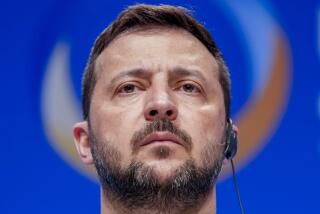PERSPECTIVE ON THE SUMMIT : Real Agenda: European Security
- Share via
When George Bush welcomes Mikhail S. Gorbachev to the White House this week, one issue will be uppermost in both men’s minds--setting terms for completing the Soviet strategic retreat from Central and Eastern Europe. The Soviet leader underscored this point last week by reiterating his opposition to East Germany’s becoming a member of NATO after unification.
This is not, of course, the advertised centerpiece of the summit--an agreement to cut U.S. and Soviet nuclear arsenals by about 30%. Following last year’s earthquake in East-West relations, putting the nuclear arms race on a downward spiral has become less urgent.
As the Gorbachev demarche on Germany made clear, it is more immediately critical to devise a means for getting Soviet troops out of the Warsaw Pact countries. In time, Moscow will remove these troops, which number more than half a million, because they no longer serve a useful purpose. They do not keep down subject populations, prop up Communist regimes, guard against a putative Western onslaught, intimidate the West or pose a credible military threat. Their only remaining role has been emphasized by the Soviet leader: to give the Soviets some say in the development of both German unity and new European security arrangements.
In fact, Moscow gave up any practical leverage when the Berlin Wall opened and Communist regimes fell. Should they wish to do so, the United States and the European countries could organize security from the Soviet-Polish border westward, and a united Germany can bea full NATO partner whether or not the Soviets like it.
Fortunately, Bush and principal Western leaders understand the long-term folly of blatantly exploiting current Soviet weakness. Thus they have sanctioned the so-called two-plus-four talks, which include the two Germanys and the four World War II victors. These talks have an elaborate agenda but in fact are primarily a device to help ease Gorbachev’s domestic difficulties at losing the right to veto German actions.
Yet Western efforts to help the Soviet leader save face apparently have not been sufficient. Moscow has distinctly slowed down the pace of East-West talks on reducing conventional forces in Europe, and now Gorbachev has threatened a “fresh look.” Beyond an obvious attempt to raise the ante on Germany unity, the Soviet leader probably has something more far-reaching in mind. It is characteristic for him to leapfrog the final phase of Cold War diplomacy and focus on long-term European security arrangements.
Thus we should not be surprised this week if Gorbachev follows up his warning on Germany--which must contain a good deal of bluff--by laying out proposals for an all-European security system in which the Soviet Union plays a key role. Indeed, in his presidential inaugural speech he promised to reveal his thinking on this subject during 1990.
Moscow’s chosen instrument is the Conference on Security and Cooperation in Europe, composed of 33 European states plus the United States and Canada. The conferees have met periodically for the past 15 years, but so far CSCE has been no more than a talking shop.
Judged by requirements of European security, Washington rightly criticizes CSCE: It has neither forces nor means of directing them, and it is flatly incapable of disciplining any state that might threaten the European peace. But virtually all European countries do accept a major role for CSCE in any political understandings that span the Continent.
The Bush Administration has been slow to grasp this fact of European life and to try shaping CSCE to its own desires. Gorbachev therefore has an opening to assert CSCE’s primacy over any other arrangements, including the merging of the eastern part of a united Germany into NATO.
Despite Gorbachev’s turning up the diplomatic heat, Bush must beware at the summit of appearing to talk about Germany’s future behind its back. But he must also give proper weight to Soviet concerns about relinquishing control over the future of Germany--a nation that killed 22 million Soviets in the Great Patriotic War.
Bush can resolve this dilemma by dealing now with the long-term requirements of European security, including legitimate Soviet needs. That means championing the cause of CSCE, but in the same breath taking the initiative on practical steps needed to make it an effective complement, rather than rival, to arrangements that keep Germany embedded in the West.
As part of the counter to Gorbachev, Bush must also show the Soviets that the United States is serious about the freedom and independence of East European states, by committing U.S. economic resources many times today’s niggardly and shortsighted subvention. Above all, the President needs to renew the most precious of all postwar commodities in Europe: American leadership in crafting a vision of a secure future.
Putting a unified Germany in its place has taken precedence over nuclear arms. Is Bush ready to deal on this?
More to Read
Sign up for Essential California
The most important California stories and recommendations in your inbox every morning.
You may occasionally receive promotional content from the Los Angeles Times.













